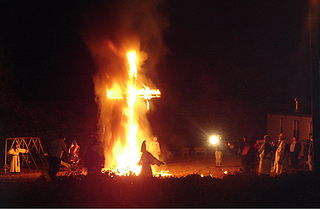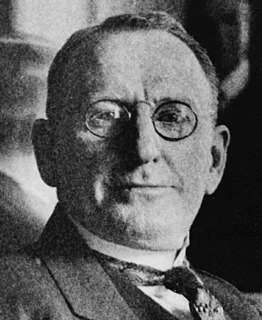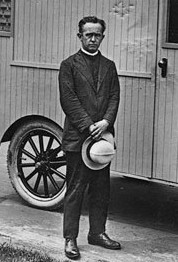
The Ku Klux Klan, commonly shortened to the KKK or the Klan, is an American white supremacist, right-wing terrorist, and hate group whose primary targets are African Americans, Jews, Latinos, Asian Americans, and Catholics, as well as immigrants, leftists, homosexuals, Muslims, abortion providers and atheists.

Charles Edward Daniels was an American singer, musician, and songwriter. His music encompassed multiple genres in a career spanning five decades, including southern rock, country rock, country, bluegrass, blues and gospel. He was best known for his number-one country hit "The Devil Went Down to Georgia". Much of his output, including all but one of his eight Billboard Hot 100 charting singles, was credited to the Charlie Daniels Band.

In modern times, cross burning or cross lighting is a practice which is associated with the Ku Klux Klan. However, it was practiced long before the Klan's inception. Since the early 20th century, the Klan burned crosses on hillsides as a way to intimidate and threaten black Americans and other non-whites.
The National Association for the Advancement of White People (NAAWP) is a white supremacist organization established in 1979 by former Ku Klux Klan Grand Wizard David Duke., deriving its name from the National Association for the Advancement of Colored People. It is considered a racist hate group by the Southern Poverty Law Center.

"The Devil Went Down to Georgia" is a song written and performed by the Charlie Daniels Band and released on their 1979 album Million Mile Reflections.

William Joseph Simmons was an American preacher and fraternal organizer who founded and led the second Ku Klux Klan from Thanksgiving evening 1915 until being replaced in 1922 by Hiram Wesley Evans.
Country rap is a fusion genre of popular music, blending country music with hip hop–style singing or rapping.
James William "Catfish" Cole was an American soldier and evangelist who was leader of the Ku Klux Klan of North Carolina and South Carolina, serving as a Grand Dragon.

Women of the Ku Klux Klan (WKKK), also known as Women's Ku Klux Klan, and Ladies of the Invisible Empire, held to many of the same political and social ideas of the KKK but functioned as a separate branch of the national organization with their own actions and ideas. While most women focused on the moral, civic, and educational agendas of the Klan, they also had considerable involvement in issues of race, class, ethnicity, gender, and religion. The women of the WKKK fought for educational and social reforms like other Progressive reformers but with extreme racism and intolerance. Particularly prominent in the 1920s, the WKKK existed in every state, but their strongest chapters were in Ohio, Pennsylvania, Indiana, and Arkansas. White, native-born, Protestant women over age 18 were allowed to join the Klan. Women of the Klan differed from Klansmen primarily in their political agenda to incorporate racism, nationalism, traditional morality, and religious intolerance into everyday life through mostly non-violent tactics.

"Uneasy Rider" is a 1973 song written and performed by American singer and multi-instrumentalist Charlie Daniels. It consists of a narrative spoken over a guitar melody, and is sometimes considered a novelty song. It was released as a single and appeared on Daniels' album Honey in the Rock which is also sometimes known as Uneasy Rider.
Barefoot Jerry is an American country rock band from Nashville, Tennessee. Fusing country music and progressive rock, they have been described as a seminal southern rock band. The band was most active from 1971 to 1977. It was composed of area studio musicians under the tutelage of Wayne Moss and Mac Gayden. Barefoot Jerry was named after a country fiddle player who performed inside a store next to Gayden's home in the Smoky Mountains.

Branford Edward Clarke was an Evangelical preacher, poet and artist who promoted the Ku Klux Klan through his art which was drawn for the Pillar of Fire Church and their publications.
"Long Haired Country Boy", is a song written and performed by the Charlie Daniels Band and released on their 1974 album Fire on the Mountain. It was first released as a single in April, 1975 and was re-released as a single in January, 1980. In 2019, it was covered by Cody Johnson on his album, Ain't Nothin' to It.
White power music is racist music that promotes white nationalism. It encompasses various music styles, including rock, country, experimental music and folk. Ethnomusicologist Benjamin R. Teitelbaum argues that white power music "can be defined by lyrics that demonize variously conceived non-whites and advocate racial pride and solidarity. Most often, however, insiders conceptualized white power music as the combination of those themes with pounding rhythms and a charging punk or metal-based accompaniment." Genres include Nazi punk, Rock Against Communism, National Socialist black metal, and fashwave.
Volunteer Jam: The Movie is a DVD by bluegrass and country rock artist Charlie Daniels. Daniels has a series of concerts and albums titled Volunteer Jam. It is a concert film from the second Volunteer Jam and is called 'The First Full-Length Southern Rock Motion Picture'. It was shot in 1975. It was released on DVD on September 4, 2007.
The National Knights of the Ku Klux Klan is a Klan faction that has been in existence since November 1963. In the sixties, the National Knights were the main competitors against Robert Shelton's United Klans of America.

The Loyal White Knights of the Ku Klux Klan is a group styled after the original Ku Klux Klan (KKK). Formed around 2012, it aims to "restore America to a White, Christian nation founded on God's word".

"Fire on the Mountain" is a song written by George McCorkle of The Marshall Tucker Band. The song was originally recorded by the band on their 1975 album, Searchin' for a Rainbow, and released as the album's first single. It peaked at number 38 on the Billboard Hot 100.
"From Dixie with Love", also known as "Slow Dixie", is an American song combining elements of "Dixie" and the "Battle Hymn of the Republic". It was created and predominantly performed as the fight song at the University of Mississippi. In 2009, the Chancellor Dan Jones requested the university's The Pride of the South marching band stop playing "From Dixie with Love" at university sports events. According to some alumni and current students, it is now banned from being played in public. This has not been independently confirmed.










